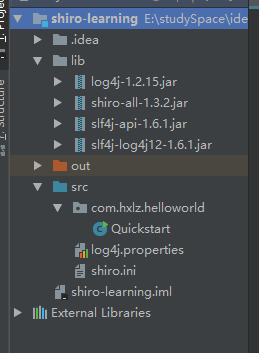1.目录结构

2.log4j.properties
# # Licensed to the Apache Software Foundation (ASF) under one # or more contributor license agreements. See the NOTICE file # distributed with this work for additional information # regarding copyright ownership. The ASF licenses this file # to you under the Apache License, Version 2.0 (the # "License"); you may not use this file except in compliance # with the License. You may obtain a copy of the License at # # http://www.apache.org/licenses/LICENSE-2.0 # # Unless required by applicable law or agreed to in writing, # software distributed under the License is distributed on an # "AS IS" BASIS, WITHOUT WARRANTIES OR CONDITIONS OF ANY # KIND, either express or implied. See the License for the # specific language governing permissions and limitations # under the License. # log4j.rootLogger=INFO, stdout log4j.appender.stdout=org.apache.log4j.ConsoleAppender log4j.appender.stdout.layout=org.apache.log4j.PatternLayout log4j.appender.stdout.layout.ConversionPattern=%d %p [%c] - %m %n # General Apache libraries log4j.logger.org.apache=WARN # Spring log4j.logger.org.springframework=WARN # Default Shiro logging log4j.logger.org.apache.shiro=TRACE # Disable verbose logging log4j.logger.org.apache.shiro.util.ThreadContext=WARN log4j.logger.org.apache.shiro.cache.ehcache.EhCache=WARN
3.shiro.ini
# # Licensed to the Apache Software Foundation (ASF) under one # or more contributor license agreements. See the NOTICE file # distributed with this work for additional information # regarding copyright ownership. The ASF licenses this file # to you under the Apache License, Version 2.0 (the # "License"); you may not use this file except in compliance # with the License. You may obtain a copy of the License at # # http://www.apache.org/licenses/LICENSE-2.0 # # Unless required by applicable law or agreed to in writing, # software distributed under the License is distributed on an # "AS IS" BASIS, WITHOUT WARRANTIES OR CONDITIONS OF ANY # KIND, either express or implied. See the License for the # specific language governing permissions and limitations # under the License. # # ============================================================================= # Quickstart INI Realm configuration # # For those that might not understand the references in this file, the # definitions are all based on the classic Mel Brooks' film "Spaceballs". ;) # ============================================================================= # ----------------------------------------------------------------------------- # Users and their assigned roles # # Each line conforms to the format defined in the # org.apache.shiro.realm.text.TextConfigurationRealm#setUserDefinitions JavaDoc # ----------------------------------------------------------------------------- [users] # user 'root' with password 'secret' and the 'admin' role root = secret, admin # user 'guest' with the password 'guest' and the 'guest' role guest = guest, guest # user 'presidentskroob' with password '12345' ("That's the same combination on # my luggage!!!" ;)), and role 'president' presidentskroob = 12345, president # user 'darkhelmet' with password 'ludicrousspeed' and roles 'darklord' and 'schwartz' darkhelmet = ludicrousspeed, darklord, schwartz # user 'lonestarr' with password 'vespa' and roles 'goodguy' and 'schwartz' lonestarr = vespa, goodguy, schwartz # ----------------------------------------------------------------------------- # Roles with assigned permissions # # Each line conforms to the format defined in the # org.apache.shiro.realm.text.TextConfigurationRealm#setRoleDefinitions JavaDoc # ----------------------------------------------------------------------------- [roles] # 'admin' role has all permissions, indicated by the wildcard '*' admin = * # The 'schwartz' role can do anything (*) with any lightsaber: schwartz = lightsaber:* # The 'goodguy' role is allowed to 'delete' (action) the user (type) with # license plate 'zhangsan' (instance specific id) goodguy = user:delete:zhangsan
4.Quickstart.java
package com.hxlz.helloworld; import org.apache.shiro.SecurityUtils; import org.apache.shiro.authc.*; import org.apache.shiro.config.IniSecurityManagerFactory; import org.apache.shiro.mgt.SecurityManager; import org.apache.shiro.session.Session; import org.apache.shiro.subject.Subject; import org.apache.shiro.util.Factory; import org.slf4j.Logger; import org.slf4j.LoggerFactory; public class Quickstart { private static final transient Logger log = LoggerFactory.getLogger(Quickstart.class); public static void main(String[] args) { Factory<SecurityManager> factory = new IniSecurityManagerFactory("classpath:shiro.ini"); SecurityManager securityManager = factory.getInstance(); SecurityUtils.setSecurityManager(securityManager); // 获取当前的 Subject. 调用 SecurityUtils.getSubject(); Subject currentUser = SecurityUtils.getSubject(); // 测试使用 Session // 获取 Session: Subject#getSession() Session session = currentUser.getSession(); session.setAttribute("someKey", "aValue"); String value = (String) session.getAttribute("someKey"); if (value.equals("aValue")) { log.info("---> Retrieved the correct value! [" + value + "]"); } // 测试当前的用户是否已经被认证. 即是否已经登录. // 调动 Subject 的 isAuthenticated() if (!currentUser.isAuthenticated()) { // 把用户名和密码封装为 UsernamePasswordToken 对象 UsernamePasswordToken token = new UsernamePasswordToken("lonestarr", "vespa"); // rememberme token.setRememberMe(true); try { // 执行登录. currentUser.login(token); log.info("----> 该用户已登录!"); } // 若没有指定的账户, 则 shiro 将会抛出 UnknownAccountException 异常. catch (UnknownAccountException uae) { log.info("----> There is no user with username of " + token.getPrincipal()); return; } // 若账户存在, 但密码不匹配, 则 shiro 会抛出 IncorrectCredentialsException 异常。 catch (IncorrectCredentialsException ice) { log.info("----> Password for account " + token.getPrincipal() + " was incorrect!"); return; } // 用户被锁定的异常 LockedAccountException catch (LockedAccountException lae) { log.info("The account for username " + token.getPrincipal() + " is locked. " + "Please contact your administrator to unlock it."); } // 所有认证时异常的父类. catch (AuthenticationException ae) { } } //通过currentUser.getPrincipal()获取登录用户名 log.info("----> User [" + currentUser.getPrincipal() + "] logged in successfully."); // 测试是否有某一个角色. 调用 Subject 的 hasRole 方法. if (currentUser.hasRole("schwartz")) { log.info("----> May the Schwartz be with you!"); } else { log.info("----> Hello, mere mortal."); return; } //test a typed permission (not instance-level) // 测试用户是否具备某一个行为. 调用 Subject 的 isPermitted() 方法。 if (currentUser.isPermitted("lightsaber:weild")) { log.info("----> You may use a lightsaber ring. Use it wisely."); } else { log.info("Sorry, lightsaber rings are for schwartz masters only."); } //a (very powerful) Instance Level permission: // 测试用户是否具备某一个行为. if (currentUser.isPermitted("user:delete:zhangsan")) { log.info("----> You are permitted to 'drive' the winnebago with license plate (id) 'eagle5'. " + "Here are the keys - have fun!"); } else { log.info("Sorry, you aren't allowed to drive the 'eagle5' winnebago!"); } // 执行登出. 调用 Subject 的 Logout() 方法. System.out.println("---->" + currentUser.isAuthenticated()); //登出 currentUser.logout(); System.out.println("---->" + currentUser.isAuthenticated()); System.exit(0); } }